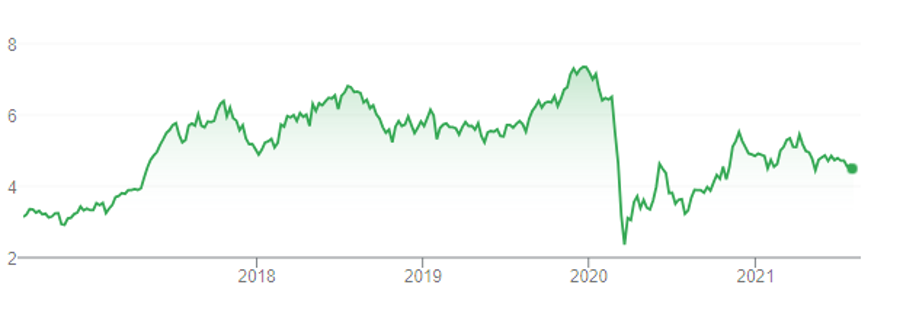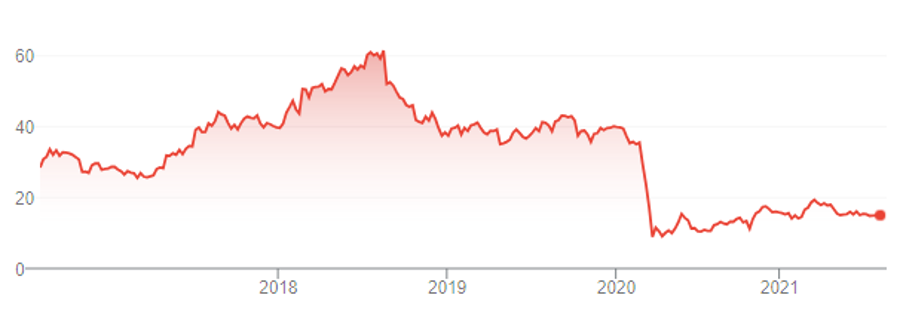An estimated 100,000 people flocked to the famed Lollapalooza music festival in Chicago this month, despite surging cases of Covid in that city and across the United States.
Global cruise lines last month reported that luxury voyages sold out within hours of being offered, even though the cruise industry had much-publicised Covid problems.
Passenger volumes at Los Angeles airports have soared. In May, Nevada casinos reported record winnings, up 25% on a year ago, even though Covid is still a problem in Las Vegas.
These figures are just a glimpse of the pent-up demand for travel and entertainment – and what happens when lockdown restrictions end. They’re also a reason why investors are buying “re-opening” stocks that will benefit as domestic and international borders eventually reopen.
Australia is expected to follow the international experience when our vaccine rollout quickens and 80% of our population (hopefully) is fully vaccinated. However, care is needed with re-opening stock plays.
For a start, I doubt everything will suddenly return to normal when “Freedom Day” finally arrives. Many people will still be reluctant to travel overseas or go to large events.
Virus mutation is an ongoing threat. Some countries that have high inoculation rates are grappling with new Covid waves and face the prospect of more lockdowns.
Then there are company valuations. The market knows the potential of stocks leveraged to easing lockdown restrictions. For 18 months, I’ve heard fund managers talk about buying “reopeners”, only to buy them too early and suffer as share-price rallies are short-lived.
A better play has been lockdown beneficiaries. JB Hi-Fi (JBH), Beacon Lighting Group (BCN), Nick Scali (NCK) and Adairs (ADH), for example, rallied as consumers bought home appliances and furnishings. Their share-price gains will be slower from here, but these stocks still have good tailwinds.
With reopening trades, investors typically focus on travel- or entertainment-related companies that were the first to be affected by lockdown and the last to emerge from it. But a range of sectors could benefit as life eventually returns to a kind of normal in 2022.
Listed funeral operators Invocare (IVC) and Propel Funeral Partners (PFP) are an example. As the Covid vaccine is rolled out, funeral restrictions should fully ease, and higher-margin funeral services resume. As awful as it sounds, more people could get the flu and die, compared to when we stayed indoors or “masked up” in public, which limited the spread of influenza last year.
Invitro fertilisation stocks, such as Monash IVF Group (MVF), could benefit as more people resume this service when lockdowns end. So, too, Capitol Health (CAJ), which looks interesting as management strengthens the business and diagnostic imaging volumes rise after Covid.
1300 Smiles (ONT) and other dentistry stocks should benefit when lockdown restriction end as people who deferred or cancelled their annual dental check-up catch up on treatments. Hospital stocks could also benefit as elective surgeries, which had been postponed during Covid, resume.
Clearly, there are a lot of ways to play the reopening trade beyond travel and entertainment. I see two main questions: timing and company quality/valuation.
The best time to buy reopening stocks is anybody’s guess. But with Sydney and Brisbane in lockdown, and signs that the national vaccine rollout is gathering pace, now looks reasonable. Buying when news is bad – but recovery is in sight – is usually a good strategy.
My preference is high-quality, large-cap stocks that still trade below their intrinsic value – and will benefit as borders reopen and Covid hopefully becomes less of a threat.
Here are 3 stocks that fit the bill (Auckland International Airport (AIA) also looks interesting. I’ll cover it in coming weeks in this column).
1. Qantas Airways (QAN)
I nominated Qantas as one of my stocks for 2021, but its share price has mostly been range bound this year. With international borders firmly shut, and sudden closures of domestic borders creating travel chaos, it’s no wonder Qantas has underperformed.
So much depends on the timing of international borders reopening. If one assumes a full recovery in Qantas’ domestic capacity by the end of FY22, and a gradual reopening of international borders from next year, the stock looks interesting.
Air-travel demand could remain highly volatile for some time. But when the public believe they can book interstate and international travel with confidence, Qantas will soar back to full capacity. It should emerge from the pandemic with a lower cost base after job cuts.
Qantas is no screaming buy. Its stand-down this week of 2,500 employees reinforces how leveraged Qantas is to domestic and international border re-openings.
Morningstar’s valuation of $5 a share suggests Qantas is moderately undervalued at $4.52. I can’t see much downside from here, provided the vaccination rollout continues to gather pace and we head towards 80 per cent full vaccination in the next six months.
Chart 1: Qantas (QAN)

Source: ASX
2. The Star Entertainment Group (SGR)
I wrote favourably about the casino group for the Switzer Report in July. Again, it looks like a horrible time to buy The Star with Sydney in lockdown. But its share price has fallen more than 10 per cent since early July as the market factored in an extended Sydney lockdown.
As I wrote in July, the latest lockdown is an opportunity to buy into The Star at a cheaper entry point. Yes, there’s regulatory risk with casinos and negative sentiment because of Crown’s problems. And longer term, the threat to The Star from a second Sydney casino.
But overseas casinos roared back to life after lockdown restrictions ended – far more than the US market expected. It’s hard now to see a similar casino recover in Australia but watch for punters flocking back to casinos later this year.
The Star is well positioned for the rebound, given its flagship Sydney casino and, longer term, its impressive Queen’s Wharf development in Brisbane.
Chart 2: The Star Entertainment Group (SGR)

Source: ASX
3. Flight Centre Travel Group (FLT)
It’s hard to believe Flight Centre traded above $60 in 2018. The travel agent was heading south before Covid, but the pandemic crushed its valuation. As markets crashed in March 2020, Flight Centre sank to about $9. It now trades at $15.13.
Flight Centre faces that awful combination: short-term cyclical headwinds from Covid and its effect on travel bookings; and long-term structural challenges as more leisure bookings migrate online and move away from traditional bricks-and-mortar travel agents.
As consumers deal directly with suppliers through online platforms, travel-agent commissions will remain under pressure. The bears fear Flight Centre will continue to be weighed down by its large physical store network, and rental and wage costs.
It’s a good sign that Flight Centre’s share price is largely unchanged since the Sydney lockdown began on June 26. Several other travel stocks have also traded mostly sideways in the past six weeks (albeit in a rising sharemarket). That suggests the market has factored in the extended lockdown and might be thinking this is as bad as it gets for travel-related stocks.
Unlike other ASX-listed travel stocks, about half of Flight Centre’s Total Transaction Value (TTV) is made outside of Australia and New Zealand – in markets that have a higher rate of full vaccination and are thus closer to life returning to normal.
Flight Centre also makes a big chunk of its TTV from corporate travel, which has been less affected by the pandemic compared to leisure travel.
It could take several years for Flight Centre’s earnings to return to pre-Covid levels. However, buying the stock during a period of extreme pessimism has been a profitable strategy in the past and will be again, provided we are through the worst of the lockdowns by Christmas.
Like other reopener stocks, Flight Centre will do brisk business when most Australians are fully vaccinated, international borders start to reopen, Covid fears ease and millions of people unleash two years of pent-up demand for travel.
Again, it’s hard to see that now. But investors who wait for a high vaccination rate and signs of soaring demand in travel and entertainment will be too late.
A better strategy is buying when the market is fearful, provided investors can hold reopener stocks for at least a few years, and have high tolerance for risk and volatility.
Sadly, there could be plenty of twists and turns to go with the Delta variant, and possibly other mutations, in coming years. But the reopening trades look to have much stronger foundations for a share-price recovery as the vaccine “stroll out” finally picks up pace.
Chart 3: Flight Centre Travel Group (FLT)

Source: ASX
Tony Featherstone is a former managing editor of BRW, Shares and Personal Investor magazines. The information in this article should not be considered personal advice. It has been prepared without considering your objectives, financial situation or needs. Before acting on information in this article consider its appropriateness and accuracy, regarding your objectives, financial situation and needs. Do further research of your own and/or seek personal financial advice from a licensed adviser before making any financial or investment decisions based on this article. All prices and analysis at August 3, 2021.